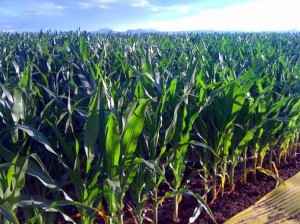We take a tour of Open Space farms
Community Input | Jul 16, 2010
“Cookies anyone? Lemonade?” asked Ron Stewart, director of Boulder County’s Open Space Department. On the evening of July 13, he enthusiastically shared snacks and his knowledge of agriculture in Boulder as the second of four Cropland Policy Agricultural Tours departed from the parking lot of the Boulder County Fairgrounds.

These tours are meant to inform the public and advisory committees about the issues relevant to the Cropland Policy. The Cropland Policy is designed to address the gap between the Open Space Department’s daily management practices and the County Comprehensive Plan’s directives regarding the management of open space and agricultural land. The policy will outline the guiding principles that county staff will use to make management decisions on open space properties managed as cropland.
The rural appearance of large swaths of Boulder County is not an accident. It is founded in a long and storied appreciation for the value of open land, dating back to the mid-nineteenth century, but most recently codified in the 1970s via the Boulder County Comprehensive Plan and the creation of the Open Space Department. The County oversees more than 94,000 acres of open space. Of those, roughly 25,000 acres is leased to 85 farmers under various lease arrangements. So, on your next circle-Boulder-through-open-space bike ride, remember that some county-owned open space may be somebody’s private farm field that is also county-owned and will never be developed into anything else.
Our first stop was at Wyatt Barnes’s and Amy Tisdale’s Red Wagon Organic Farm. This plot showcases a new lease/buy arrangement that is the first of it’s kind. It is intended to help farmers with their biggest challenge: the high price of land in the county. Farmers can bid on the house plus one acre. The bid process is open to the general public, advertised in local publications and awarded based on the applicant’s ability to follow-through on the terms of the sale. Upon a successful bid, part of the sale contingency is a lease commitment to organically farm several adjacent acres. Can Barnes and Tisdale make money at it? Yes, but with very long hours and working against the tide of our culture’s—as Amy Tisdale put it—“undervaluing of food.”
At Niwot Farms, the second stop, John Schlagel was the first to farm on Open Space. His natural beef operation consists of more than 1,000 head of cattle. But, make no mistake, his is a feedlot operation. While cows do spend time grazing on grass, they also eat corn products such as distiller’s grain, which is a byproduct of ethanol production, and GMO corn he grows on site. The corn rows adjacent to the cow pens that stand tall and weed free allow him to keep his work load and staff to a minimum, making it economically feasible to farm as he does. His meat, processed and distributed by Meyer Natural Beef (formerly Coleman Natural), ends up at places like Whole Foods and Good Times.
Third generation Boulder County farmer Jules Van Thuyne, Jr. spoke to us on our third stop. Of his nearly 1,800-acre operation, 950 are leased from the Boulder County. He grows corn, wheat, sugar beets, sunflowers, pinto beans, and alfalfa. He is pioneering no-till farming in the county— an agricultural technique that increases the amount of water in the soil and decreases erosion, while maintaining the amount and variety of life in and on the soil. As the sun set behind a spectacular view of the Front Range with a dryland sunflower crop in the foreground, Mr. Van Thuyne spoke sentimentally of farming and of his soft spot for conservation easements as a method of addressing the biggest challenge to farmer’s today. Wikipedia defines a conservation easement as an encumbrance that creates a legally enforceable land preservation agreement between a landowner and a government agency (municipality, county, state, federal) or a qualified land protection organization (often called a “land trust”), for the purposes of conservation. It restricts real estate development, commercial, and industrial uses, and certain other activities on a property to a mutually agreed upon level. The property remains the private property of the landowner. Van Thuyne’s ability to buy his original farmland came as a result of a conservation easement, without which the land price would have made it impossible for him to own land. Which brought us full circle to the reason for the County’s lease/buy trial at Red Wagon Organic Farm.
Back at the fairgrounds, Ron Stewart stood at the bottom of the bus steps, collecting evaluation forms and bidding people good night. We hope the County gets high marks for these tours; this one was fun and highly educational. What a wonderful way to spend a warm summer evening.
If you’re interested in participating in one of the next tours on August 10 and September 20, register at least one week ahead of time at the County’s website.

